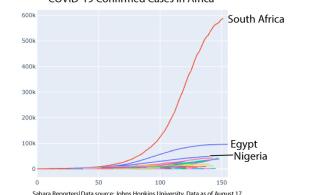
Nigeria does not keep death records. It is not feasible to compare death rates over a time. And it is unlikely that surveys will be conducted to discover the extent of people who have died of Covid-19 in Nigeria.
Look at the data. It appears that Covid-19, the disease caused by the novel coronavirus, has spared Nigeria. The country has confirmed fewer than fifty thousand cases and recorded fewer than one thousand deaths since late February when the first case was announced by the government.
Compare with the rest of the world where Covid-19 has sickened more than 21 million people and killed nearly 800 thousand, Nigeria could be described as a success story if only the extent of the infections and deaths are known.

The problem is that Nigeria does not have the capacity to test enough people.
“We can compare a laboratory to a group of kitchens,” wrote Chikwe Ihekweazu, Director-General, Nigeria Centre for Disease Control, in an op-ed “Six Months in the Eye of the COVID-19 Storm”. His analogy captures the Covid-19 situation in the country.
“The pots as equipment, ingredients as reagents, and the lab scientists as the cooks,” Ihekweazu wrote. “If you have a great distribution of kitchens, pots, ingredients and cooks – it is easy to switch from cooking rice to cooking egusi soup.
“This is what South Africa and many other countries in the West could do. This is what we could not do in Nigeria– we simply did not have the appropriate or even enough kitchens, pots, ingredients and cooks to switch quickly.”
South Africa has tested more than 3 million people while Nigeria has not done up to half a million. The results are glaring. South Africa accounts for about a half of the confirmed cases and deaths in Africa.
It is obvious that apart from South Africa, the rest of the continent is still much in dark about the extent of Covid-19 infections and deaths. Now scientists are trying to figure out the real situation since official data offers little clue.
In many places across Africa and around the world, scientists are conducting antibody surveys to find out who have had the virus. The World Health Organizations said these surveys will answer critical questions about Covid-19 infections.
Such questions, according to WHO, include how frequently infection occurs among different populations, how many people have had mild or asymptomatically infection, how many people have been infected but may not have been identified by routine disease surveillance, and what proportion of the population may be immune from infection by Covid-19 in the future.
Until the results of these studies come out, it is too early to say that Covid-19 has spared Nigeria or Africa.
Nigeria does not keep death records. It is not feasible to compare death rates over a time. And it is unlikely that surveys will be conducted to discover the extent of people who have died of Covid-19 in Nigeria. The untested dead would probably not count.